Maths and numeracy skills play a crucial role in the lives of everyone, from working out household bills to getting the skills to find better paid work. In London, the mayor is committed to making sure all Londoners have the skills they need to succeed in a fair, inclusive, and thriving society. This includes increasing participation and progression in numeracy skills training.
In the past year more than 24,000 adults in London have accessed maths and numeracy courses funded by the mayor through the adult education budget (AEB). Nevertheless, low participation in numeracy courses and negative attitudes to maths continue to be a challenge. Some estimates suggest 58 per cent of Londoners have low numeracy skills and are therefore more likely to earn less and face a higher risk of unemployment.
In his recent speech on improving attainment in maths, the prime minister set out an ambition to tackle the national “anti-maths” mindset with a proposal for all learners in England to study maths until the age of 18. This renewed focus on increasing numeracy levels and challenging negative attitudes to maths is welcome, but any real success beyond the rhetoric will only be achieved through a local approach to delivery.
London can lead the way in improving the skills and life chances of Londoners
The success of London Multiply demonstrates the importance of adopting a local approach to maths and numeracy skills provision. London Multiply provides access to nearly 300 free courses for adults aged 19+ who have limited qualifications in maths (below GCSE pass grade). This includes everyday money management courses that help Londoners manage their household budgets, and more employment-focused courses that help those who have been made redundant transition back into work.
The devolution of London’s £320m AEB has proved to be an effective tool in making adult education more accessible, impactful, and relevant to those least likely to participate in further education – especially those who are struggling with the soaring cost of living. The mayor has introduced funding for Londoners in low-paid work to access adult learning, supporting 20,000 people a year to acquire the skills they need to secure higher-paying and more stable employment.
We know that significant negative perceptions of maths and a low awareness of the courses available can prevent Londoners accessing the training that is on their doorsteps. This is why the London Multiply programme builds on the success of the AEB delivery in working closely with community-based organisations, boroughs and colleges to tackle barriers to the uptake of numeracy courses and ensure it reaches as many people as possible.
Through the success of these programmes, we have shown London can lead the way in improving the skills and life chances of Londoners. On this National Numeracy Day, I am calling on the government to devolve all 19+ skills and employment support budgets to the mayor as part of a single pot of multi-year funding so we can continue to build a fairer and more prosperous city for everyone.

















Your thoughts